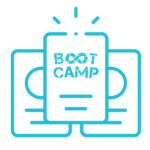DevOps training
Interactive DevOps training workshops to initiate change and promote mutual understanding. Hands-on DevOps training workshops to develop skills and accelerate deliveries.
DevOps Foundation ®
-
General public
-
Starting from 5 participants
-
2 days
DevSecOps Foundation ℠
-
General public
-
Starting from 5 participants
-
2 days
Containers: Docker Essentials
-
Dev, QA, Ops
-
Starting from 5 participants
-
2 days
Kubernetes: Orchestrating Containers
-
Dev, QA, Ops
-
Starting from 5 participants
-
2 days
Fundamentals of JAVA and Spring Boot
-
Developers
-
Starting from 5 participants
-
3 days
Microservices with Spring Boot and Spring Cloud
-
Developers
-
Starting from 5 participants
-
2 days
Fundamentals of CI/CD in Azure DevOps
-
Dev, QA, Ops
-
Starting from 5 participants
-
2 days
Linux Operating System Essentials
-
General public
-
Starting from 5 participants
-
2 days
Linux: Install, Configure, and Administer a Server
-
Ops
-
Starting from 5 participants
-
3 days
DevOps Foundation ® Certification
This DevOps training on the fundamentals of DevOps culture is intended for a wide audience of IT professionals. It gives participants foundational knowledge of DevOps terminology to ensure that everyone is speaking the same language. It also highlights how this culture helps organizations remain competitive on the market.
Participants acquire a common understanding of DevOps, a cultural movement that emphasizes communication, collaboration, integration and automation to improve workflow between developers and system administrators. The training will give you all the skills you need to pass the DevOps certification exam.
*This course allows participants to take the DevOps Foundation ® exam.
Topics covered:
DevOps objectives and vocabulary
Benefits for organizations and IT
Principles of continuous integration, continuous delivery, testing, security and the Three Ways relationship
DevOps with Agile, Lean and ITSM
Improved workflows and communication and feedback cycles
Automation practices, including deployment pipelines and DevOps toolchains
DevOps at an organizational scale
Critical success factors and key performance indicators
Concrete examples and real results

Type of workshop
Theory-based and hands-on workshop

Participants
General public. Starting from 5 participants.

Duration
2 days

Prerequisite
No prerequisite

Location
On-site or remote
DevSecOps Foundation ℠ Certification
This DevSecOps training program is intended for anyone involved in product delivery. In this session, we present the objectives, concepts, business benefits and strategies involved in integrating the security component into all development processes.
In the DevSecOps Foundation ℠ training session, we explain why DevSecOps boosts organizations’ business value, helps them score business opportunities and enhances their overall value.
We present the foundational principles of DevSecOps to demonstrate how this culture can encourage organizational transformation, increase productivity, minimize risks and help make the most of available resources. This training session will set you up for success, so you will be all set to take the DevSecOps certification exam.
*This course allows participants to take the DevSecOps Foundation ® exam.
Topics covered:
- The purpose, benefits, concepts, and vocabulary of DevSecOps
- How DevOps security practices differ from other security approache
- Business-driven security strategies and Best Practices
- Understanding and applying data and security sciences
- Integrating corporate stakeholders into DevSecOps Practices
- Enhancing communication between Dev, Sec, and Ops teams
- How DevSecOps roles fit with a DevOps culture and organization

Type of workshop
Theory-based and hands-on workshop

Participants
General public. Starting from 5 participants.

Duration
2 days

Prerequisite
No prerequisite

Location
On-site or remote
Container: Docker Essentials
- Why containerization
- Using networks with Docker
- Managing storage with Docker volumes
- Dockerfiles and image creation
- Managing a multi-container application: Docker-Compose
- Distributing Docker images of your application
- Continuous integration and deployment

Type of workshop

Participants
Dev, QA, Ops. Starting from 5 participants.

Duration
2 days

Prerequisite
Basic computer knowledge

Location
On-site or remote
Kubernetes: Orchestrating Containers
- What is Kubernetes?
- Initial descriptors
- Pods
- ConfigMap and Secrets
- ReplicaSet
- Services
- Volumes
- Deployment
- Contextualizing deployments

Type of workshop

Participants
Dev, QA, Ops. Starting from 5 participants.

Duration
2 days

Prerequisite

Location
On-site or remote
Fundamentals of JAVA and Spring Boot
- Starting a Spring Boot project
- Defining a component
- Managing dependencies with Maven and its plugins
- WebConfig, REST Controller, and bean injection
- JPA and Entities
- Creating a data model
- Properties and profiles in Spring Boot
- HTTP protocol, RestController, and JSON responses
- WebClient and connecting to an external API
- Exceptions
- DTOs and MapStruct

Type of workshop

Participants
Developers. Starting from 5 participants.

Duration
3 days

Prerequisite
Basic knowledge in software development

Location
On-site or remote
Microservices with Spring Boot and Spring Cloud
The training on Microservices with Spring Boot provides participants with a deep understanding of principles and practices for developing and deploying applications based on a microservices architecture. Participants learn how to design autonomous microservices, effectively integrate them using Spring Boot, manage communication between services, and implement resilience and scaling mechanisms to create robust and scalable applications.
- Microservices architecture
- Introduction to Spring Boot and Spring Cloud
- Externalization of configurations
- Intermicroservices communication
- Declarative microservices security
- Service discovery
- Routing with Spring Cloud Gateway
- Request tracing with Spring Cloud Micrometer and Zipkin
- Resilience using a Circuit Breaker with Resilience4J
- Full demonstration

Type of workshop

Participants
Developers. Starting from 5 participants.

Duration
2 days

Prerequisite

Location
On-site or remote
Fundamentals of CI/CD in Azure DevOps
- Introduction to DevOps and Azure DevOps overview
- Project and code management with Azure Repos, Git, and Azure Boards
- Automation of builds and tests with Azure Pipeline (basics)
- Artifact management with Azure Artifacts and Azure Pipeline Artifacts
- Pipeline security and application security management

Type of workshop

Participants
Developers. Starting from 5 participants.

Duration
2 days

Prerequisite
Basic knowledge in software development

Location
On-site or remote
Linux Operating System Essentials
- Introduction to Linux and various distributions
- Linux architecture
- Boot process
- Partitioning
- LVM
- File system: organization and basic management
- Basic Linux commands
- Command interpreter: metacharacters, input-output redirection, command history, and substitutions
- Text editor: vi and nano

Type of workshop

Participants
General public. Starting from 5 participants.

Duration
2 days

Prerequisite

Location
On-site or remote
Linux: Install, Configure and Administer a Server
- Architecture: memory, processes, input-output, and modules
- Process management: list, control, foreground, and background
- System logs
- Advanced file system management: links, properties, and access rights
- User and group management
- Application management: archives and packages
- Administration tools
- File transfers and remote sessions
- TCP/IP network configuration: network interfaces, routing, and DNS
- Linux scripting

Type of workshop

Participants
System administrators. Starting from 5 participants.

Duration
3 days

Prerequisite
Basic knowledge of Linux

Location
On-site or remote
STAY IN TOUCH
Fill out the form below and we will get back to you shortly
